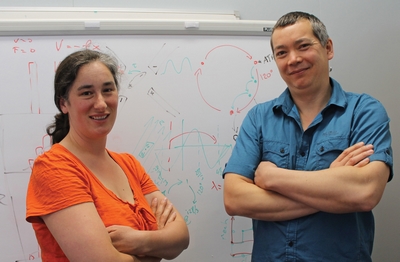Molecular motors drive energy technologies
 Scion may, at first glance, seem an unlikely place to house a team of theoretical physicists.
Scion may, at first glance, seem an unlikely place to house a team of theoretical physicists.
The team, comprising Dr Katharine Challis, Phuong Nguyen and Dr Michael Jack are working on molecular motor research and their findings have been published recently by the American Physical Society. Their research is pushing the boundaries of our knowledge in both physics and biology disciplines. It may have major implications for the future of bioenergy.
Molecular motors are specialised proteins that biological systems (including cells) use to convert energy from one form to another. These nanoscale (i.e. one-billionth of a metre) devices operate in an environment dominated by heat fluctuations. At this tiny scale, molecular motors perform their tasks with up to 97 per cent energy efficiency – far surpassing the most efficient chemical industrial processes.
The big question, as yet unanswered, is how molecular motors operate to achieve this unprecedented efficiency. The answer lies in a branch of physics called Brownian motion – a phenomenon described by Einstein over 100 years ago. Brownian motion describes the random motion of a particle in a liquid or a gas.
Einstein’s mathematical equations have been adapted to partially explain how molecular motors work – but to date, there is no explanation for their phenomenal efficiency. Katharine and Michael have a compelling mathematical theory of energy conversion in molecular motors. They hope to test their theory against single-molecule experiments at some of the world’s leading laboratories.
While their work to date is almost entirely theoretical, there are real world applications behind this research. Fundamental understanding of biological energy conversion could provide clues for developing new highly-efficient industrial energy technologies. This is the sort of knowledge that will support Scion's goal of providing leadership in New Zealand's developing bioenergy, biorefining, and industrial biotechnology industries.
Contact Dr Katharine Challis
